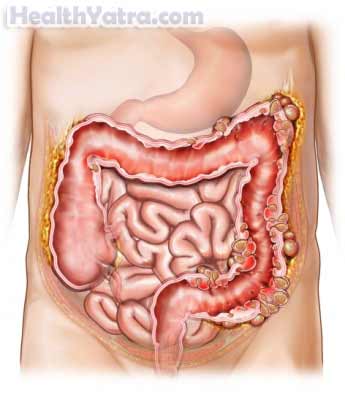Definition
A pouch that forms in the wall of the large intestine is called a diverticulum. When this pouch becomes infected or swollen, it is called diverticulitis.

Causes
It is not clear why the pouches form. It may be due to a constant build up of pressure when food moves too slowly through the bowel. This pressure increases and pushes along the sidewalls of the bowel creating pouches. Digested food or stool can become trapped in one of the pouches. This leads to swelling and infection.
The following may contribute to diverticulitis:
- Low-fiber diet—Fiber softens stools and makes them pass through the bowel more easily
- Increased pressure in the bowel from straining to pass a hard stool
- Defects in the colon wall
- Chronic constipation
Risk Factors
Factors that increase your chance of getting diverticulitis include:
- Eating a low-fiber diet
- Age: 50 or older
- Previous episodes of diverticulitis
- High-meat diet or high-protein diet
- Chronic constipation
- Smoking
Symptoms
Symptoms can come on suddenly. They vary depending on the degree of the infection.
Symptoms include:
- Abdominal pain
- Tenderness; usually in the lower left part of the abdomen
- Swollen and hard abdomen
- Fever
- Chills
- Poor appetite
- Nausea
- Vomiting
- Diarrhea
- Constipation
- Both diarrhea and constipation
- Cramping
- Rectal bleeding
Diagnosis
The doctor will ask about your symptoms and medical history. A physical and rectal exam will be done. Finding the disease early is important. The pouch can break, releasing stool into the abdomen. This is a medical emergency that requires surgery.
Tests may include:
- Your bodily fluids and waste products may be tested. This can be done with:
- Stool sample analysis
- Blood tests
- Images may need to be taken of your bodily structures. This can be done with:
- X-rays
- CT scan
- Ultrasound
After the inflammation subsides, other tests may be performed to examine the colon, including:
- Barium enema
- Flexible sigmoidoscopy
- Colonoscopy
Treatment
The goals of treatment is to:
- Resolve the infection and inflammation
- Rest the bowel
- Prevent complications
Treatments include:
Medications
Antibiotics and other drugs are given to fight the infection. Pain medications and drugs are given to decrease the abdominal pain.
You may also be given medication to help control vomiting.
Fluids
For mild swelling, you can drink clear liquids for the first two to three days. For a more severe case, you will be admitted to the hospital, where fluids are given by IV. Antibiotics will also be given to you through IV.
Preventive Care
Changes in your diet can help prevent future attacks.
- Increase the amount of fiber you eat by eating more fruits, vegetables, and whole grains
- Supplement your diet with a fiber product, as advised by your doctor
- Avoid laxatives and enemas
- Avoid narcotic medications—they can slow down bowel movement and can cause constipation
Surgery
Surgery to remove the section of the bowel with pouches may be recommended if:
- You have had multiple attacks during a two-year period
- A pouch breaks and the contents spread into the abdominal cavity, which requires that the cavity be cleaned out
Surgery is also used to treat complications of diverticulitis, such as:
- Abscess—occurs if the infected pouch fills with pus
- Blocked bowel—scar tissue that forms and blocks movement of stool through the intestine
- Fistula—occurs if the infection spreads and colon tissue attaches to another organ, such as the bladder or the uterus/vagina
When surgery is done on an elective basis, the surgeon will remove the part of the bowel that is diseased and connect the normal parts of the bowel back together.
When surgery is done on an emergency basis, the diseased part of the bowel will be removed. The healthy parts of the bowel will not be connected right away. Your bowel will need time to rest and heal. The upper part of the bowel will be attached to the abdominal wall. A port will allow waste to pass from the intestine to a bag outside of your body. If possible, the healthy bowel will be reconnected after 6-12 weeks.
If you are diagnosed with diverticulitis, follow your doctor’s instructions.
Prevention
The following recommendations may help prevent diverticulitis by improving the movement of stool through the bowel and decreasing constipation:
- Eat a balanced, high-fiber diet with plenty of fruits, vegetables, and whole grains
- Drink plenty of water each day
- Exercise regularly
Keywords :
Diverticulitis Definition, Diverticulitis Causes, Diverticulitis Symptoms, Diverticulitis Complications, Diverticulitis Surgery Cost in India, Diverticulitis Treatment Hospital in India, Diverticulitis Treatment in India, Diverticulitis Doctors in India, Diverticulitis Meaning in Hindi, Diverticulitis Meaning in Bengali, Diverticulitis Meaning in Arabic, Diverticulitis Treatment cost in 2024, Diverticulitis Hospital in India, Diverticulitis Treatment Near Me, What is the best medication for diverticulitis?, Is diverticulitis common in India?, How do you treat diverticulitis permanently?, Is diverticulitis a lifetime disease?, Can you fully recover from diverticulitis?, Is diverticulitis high risk?, How much does diverticulitis surgery cost in India?, Can diverticulitis be cancerous?, Can diverticulitis be cured without surgery?, What is the best home treatment for diverticulitis?, Is walking good for diverticulitis?
